
Denial Patterns In Addiction
There are many addicts who will not say that they are addicts because they do not believe that they are an addict. Some of them really do know that they are an addict but they are in denial and they just can’t see it. Living with or knowing someone who has an addiction but will not admit that they have an addiction can be very difficult. However, the addict is not going to even think about making any changes until they get past the denial that they are in. Many addicts use different denial patterns that can be easily recognized. After realizing what denial patterns the addict is using you might be able to help them break through the denial. The thing is, though, in the end it is completely up to them to move past the stage of denial. Nobody else can do it for them and you are not responsible for making them do so. Now, you can move on to learn more about these patterns.
- Avoidance: When an addict is in avoidance denial they will avoid any attempts at talking about their addiction (they will completely change the subject).
- Absolute Denial: When an addict has absolute denial they will not believe at any length that they have even the slightest problem.
- Minimizing: When an addict uses the minimizing denial pattern they believe or say that they have a problem but it isn’t as bad as others think.
- Rationalizing: When an addict uses the rationalizing denial pattern they say that if there isn’t a good reason for a problem, they don’t have to deal with the problem.
- Blaming: Many addicts use the blaming pattern and this put their problem as a responsibility of someone else.
- Comparing: Another pattern used is comparing and this is when an addict says that someone else is worse than them.
There are many other denial patterns that addicts used but the ones that are mentioned here are the most common. When you know someone who is an addict but they are in denial this can be so difficult. However, it is important to remember that you are not responsible for changing their addiction and no matter what you do they will still have an addiction. It is up to the addict to move past the stages of denial and move forward into sobriety and recovery. Nobody can make them doing it. However, knowing about these patterns can give you a better idea of where the addict is at with their addiction.
A Message From Our CEO
Medical disclaimer:
Sunshine Behavioral Health strives to help people who are facing substance abuse, addiction, mental health disorders, or a combination of these conditions. It does this by providing compassionate care and evidence-based content that addresses health, treatment, and recovery.
Licensed medical professionals review material we publish on our site. The material is not a substitute for qualified medical diagnoses, treatment, or advice. It should not be used to replace the suggestions of your personal physician or other health care professionals.





